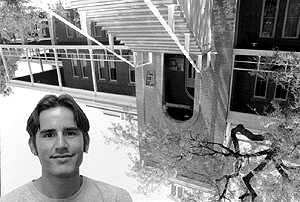

For many of us, this week is a homecoming. We are returning to a familiar environment, one which seems as comfortable as a bearskin rug near a fireplace.
For others, this week is a beginning. Those new students are entering an unknown environment, one that nurtures them like a mother, or one that cuts their legs out from under them like a demented lumberjack.
Most students come to this campus because they have a thirst for knowledge; they want to search for education. Our problem is that we view education as if it were an attainable goal instead of a path we will travel our entire lives. Education cannot be ro lled up like a diploma.
Education is not just a thing that you achieve; it is a process you undergo as naturally as you breathe. If you touch a hot frying pan, you learn that it burns. If you insult the school bully, you learn that a foot in the groin is really more painful than it looks on TV. If you put down ten shots of tequila and a six-pack of Coors, you learn what your last three meals look like after they've been digested. No one can avoid education.
Even though our education is an abstract ideal, we somehow feel that we can consolidate it into some books, lectures and facts in a classroom. The university has an important role, but that role has nothing to do with books or lectures. We are not here to learn facts, no matter how hard they try to bestow upon us that burden. Education, which has been with us every day of our existence in the form of an aura or feeling, has now magically been harnessed into four years of "real education." College simply i s not the pinnacle of all learning.
Our university is among an elite class of schools calling themselves "institutions of higher learning." However, true higher learning requires learning how to think, not what to think. In the past two years, I have learned that "W" is the symbol for tungs ten on the periodic table, Estonia is 80 kilometers from Finland, and Clever Hans was a horse who could do math problems.
What I have only rarely experienced is an environment which encourages me to take on the responsibility for my own education. Few professors have unleashed my inner curiosity, instead taming their classrooms with prefabricated answers that are an end unto themselves. In truly higher learning, the questions are more important than the answers.
Every idea begins with a question. Every great thinker in history has looked at the world in new ways, asking new questions and searching for new answers. Socrates, arguably the greatest teacher in history, taught by asking questions. He did not rely on l ectures or books, nor did he give diplomas or degrees. Socrates asked his students to think and to form their own opinions. He challenged them to defend their ideas and remain acutely aware of the fragility of every hypothesis. He would never have allowed his students to become complacent, to accept his answers instead of seeking their own. Unfortunately, we cannot have Socrates as our teacher, and, far too often, our classrooms do create this complacency.
Responsibility, however, cannot lie solely in the hands of the educational institutions. We, as students, have created our own problems. We have lost our ability to question and choked our own curiosity. We have dug our own educational graves by becoming satisfied with stagnation. Before we can begin to reap the benefits of education, we have to accept our own culpability in the current situation.
Each of us is here to discover who we are and where we are going. There is no more important part of education than that which requires us to put down our pens and to stop listening to others for the answers. We need to look inside ourselves and have the courage to admit that some answers cannot be found. We discover education only when we lose sight of the road toward education and simply enjoy the ride.
Jamie Kanter
 |
 |